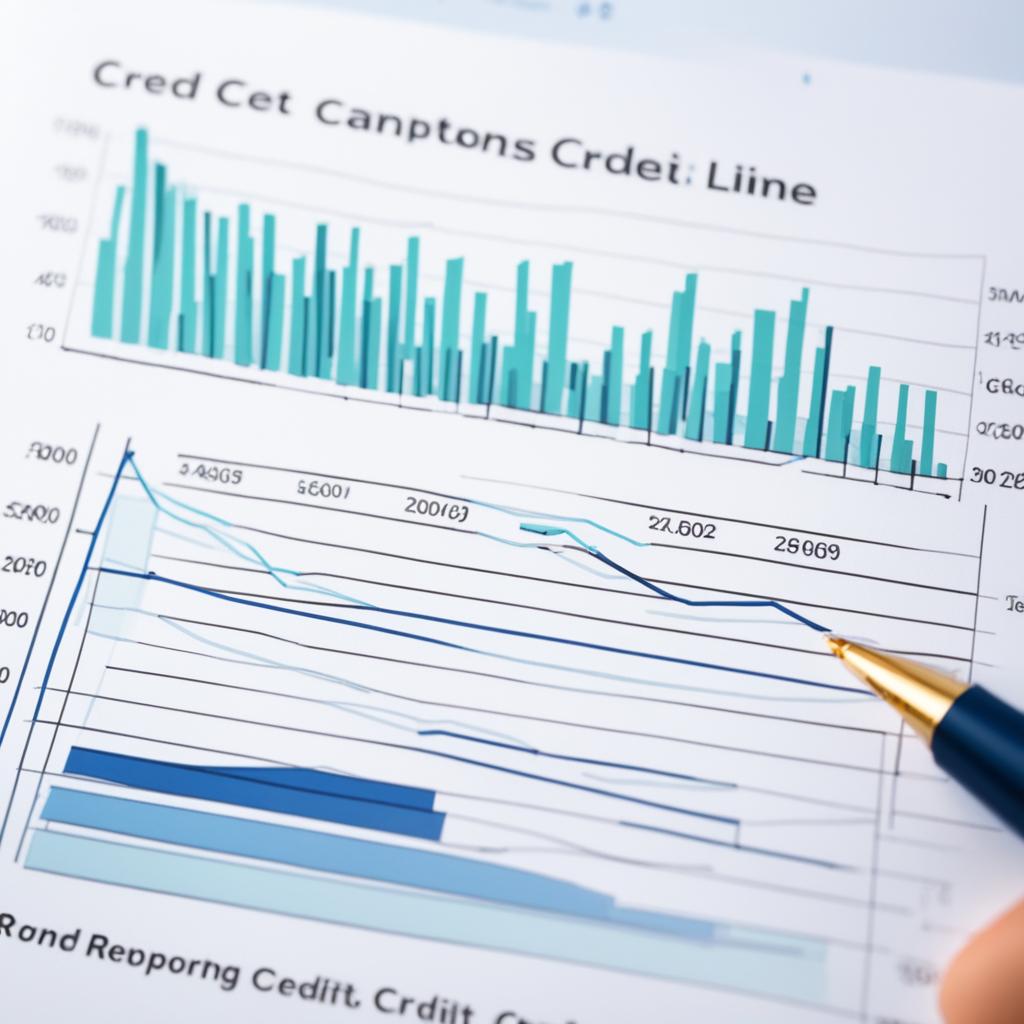Greetings! I’m here to guide you on the path to building a credit card that will elevate your credit score and open the doors to better financial opportunities. By implementing effective strategies and making smart choices, you can steadily improve your creditworthiness and secure a brighter financial future.
Building credit card savvy is crucial for improving your credit score and financial standing. It’s a step-by-step process that requires patience and discipline, but the rewards are well worth the effort.
Are you ready to embark on the journey of building your credit card? Let’s explore tried-and-true techniques and gain valuable insights into the world of credit card building.
Key Takeaways:
- Building credit card savvy is essential for improving your credit score.
- Implementing effective strategies gradually elevates your creditworthiness.
- Strategic credit card balance payments positively impact your credit score.
- Requesting higher credit limits can improve your credit utilization.
- Becoming an authorized user on someone else’s account can boost your credit score.
Understanding Credit Scores and Score Increase
When it comes to your financial health, credit scores are vital. They play a crucial role in determining your creditworthiness and can impact your ability to access loans and favorable interest rates. Understanding how credit scores work and how to increase them is essential for anyone looking to improve their credit profile.
Credit scores are typically measured on a scale that ranges from 300 to 850, with higher scores indicating better creditworthiness. A credit score above 700 is generally considered good, while scores below 600 are considered poor. However, it’s important to note that credit score ranges may vary slightly depending on the credit scoring model used by lenders and credit bureaus.
Increasing your credit score is achievable, even if you have a lower score. Small changes in your financial habits and credit management practices can lead to significant score increases over time. By taking proactive steps, you can improve your creditworthiness and gain access to better financial opportunities.
Small changes can result in significant score increases for those with lower credit scores.
Building credit requires a combination of responsible credit card usage, timely bill payments, and strategic credit management. By implementing these strategies, you can gradually improve your credit score and develop a solid credit history.
Next, we’ll explore effective techniques for building credit card savvy and increasing your credit score. We will delve into strategies such as paying credit card balances strategically, requesting higher credit limits, and becoming an authorized user on someone else’s credit card account. These techniques, along with others, can help you establish a positive credit profile and unlock better financial opportunities.
Strategic Credit Card Balance Payments
When it comes to improving your credit score, paying credit card balances strategically can make a significant impact. By focusing on credit card balances, credit utilization, and your credit score profile, you can enhance your financial standing and open doors to better opportunities.
One essential strategy to employ is to maintain a credit utilization of less than 30% on each card. Ideally, aim for an even lower utilization rate if possible. The highest scorers often have credit utilization in the single digits, showcasing a responsible approach to managing credit.
Another effective tactic is to pay down your credit card balance before the billing cycle ends or make multiple payments throughout the month. By doing so, you keep your balance low and minimize the impact on your credit utilization. This proactive approach demonstrates your ability to manage credit responsibly and positively contributes to your credit score profile.
“Paying credit card balances strategically is a proven technique to improve your credit score. By maintaining low credit utilization and paying down balances promptly, you demonstrate your creditworthiness and increase your chances of achieving a higher credit score.” – [Name Surname], Financial Expert
Optimizing Credit Card Balances for a Better Credit Score
Credit card balances play a crucial role in your credit score profile. By strategically managing them, you can boost your credit score and build a solid credit history. Here are some key tips to optimize your credit card balances:
- Keep your credit utilization below 30% on each card.
- Consider paying off your balance before the billing cycle ends.
- Make multiple payments throughout the month to keep your balance low.
- Avoid carrying high balances from month to month.
- Regularly monitor your credit reports to ensure accuracy.
By implementing these practices, you can take control of your credit card balances and improve your credit score over time. Remember, building good credit is a journey, and small steps can lead to significant progress.
| Credit Card Balance | Credit Utilization | Credit Score Profile |
|---|---|---|
| $0 | 0% | Excellent |
| $500 | 10% | Good |
| $1,000 | 20% | Fair |
| $2,000 | 40% | Poor |
As you can see from the table above, the amount of your credit card balance and its utilization directly impact your credit score profile. Keeping your balances low and your utilization rate in check can steadily improve your creditworthiness and position you for better financial opportunities.
Stay disciplined in your credit card balance payments, and watch your credit score soar!
Requesting Higher Credit Limits
One effective strategy to improve your credit utilization and boost your credit score is to request higher credit limits from your credit card issuer. Increasing your credit limits can provide you with more available credit, which can lower your credit utilization ratio. This, in turn, can have a positive impact on your credit score.
If you have a steady income or an improved credit history, you have a good chance of being approved for a higher credit limit. It’s important to approach this increase responsibly and not max out the new limit. Keeping your spending habits in check will help you avoid accumulating excessive debt and maintain a healthy credit profile.
To request a higher credit limit, reach out to your credit card issuer directly. You can contact their customer service department or check if they have an online portal for such requests. Explain your reasons for requesting the increase, emphasizing your responsible credit card usage and your desire to improve your credit score. Many credit card issuers may be willing to grant a higher limit without conducting a hard credit inquiry, which can help protect your credit score.
Benefits of Higher Credit Limits
H3: Higher credit limits offer several benefits:
- Lower credit utilization: By increasing your credit limits, you have access to more credit, which can lower your credit utilization ratio. This ratio is the amount of credit you’re using compared to the total amount of credit available to you. A lower credit utilization ratio is typically associated with higher credit scores.
- Flexibility in emergencies: Having a higher credit limit provides a safety net in case of unexpected expenses or emergencies. It gives you the ability to cover expenses when your checking account balance may be insufficient or when you need access to funds quickly.
- Potential for future credit limit increases: Demonstrating responsible credit card usage and management with a higher limit can increase your chances of getting even higher credit limits in the future. This can provide greater financial flexibility and improved credit utilization ratios.
Before requesting a higher credit limit, it’s essential to assess your own financial situation and spending habits. Ensure that you can handle a potential increase responsibly, avoiding excessive debt and keeping your credit utilization in check.
Authorized User Benefits
Becoming an authorized user on someone else’s credit card account can have significant benefits for your credit. By leveraging the account holder’s strong credit history, you have the opportunity to improve your own credit score. This can be particularly advantageous if the account has a high credit limit and a track record of consistent, on-time payments.
One of the key factors to consider when becoming an authorized user is to ensure that the account reports to all three major credit bureaus. This ensures that your involvement as an authorized user is reflected in your credit profile and can have a positive impact on your creditworthiness.
“Becoming an authorized user on someone else’s credit card account can boost your credit score by leveraging their positive credit history and payment behavior.”
It’s important to note that as an authorized user, you don’t need to have access to the physical credit card or account information. Your status as an authorized user simply allows you to benefit from the positive credit activity associated with the account.
To illustrate the impact of becoming an authorized user, consider the following hypothetical scenario:
| Scenario | Credit Score Before | Credit Score After |
|---|---|---|
| Authorized User on High-Limit Account | 650 | 720 |
| Control Group (No Authorized User) | 650 | 690 |
In this scenario, by becoming an authorized user on a high-limit credit card account, the individual’s credit score increased from 650 to 720. In contrast, the control group, without the authorized user status, saw a smaller increase to 690. This demonstrates the potential impact of authorized user status on credit scores.
Becoming an authorized user can be a valuable strategy in your credit-building journey. By leveraging the positive credit behavior of others, you can accelerate your own credit growth and increase your access to better financial opportunities.
Timely Bill Payments
Paying bills on time is crucial for maintaining a good credit score. Late payments can have a negative impact on your credit reports and stay on record for up to seven years. To avoid potential credit score damage, it’s important to prioritize timely bill payments and stay current with all your financial obligations.
If you happen to miss a payment, don’t panic. Instead, take immediate action by contacting the creditor and making the payment as soon as possible. It’s also worth reaching out to them to explain the situation and request that they reconsider reporting the missed payment to the credit bureaus. While they aren’t obligated to grant your request, some creditors may be willing to work with you, especially if it’s an isolated incident and you have a history of on-time payments.
Consistently making on-time bill payments is one of the most effective ways to positively influence your credit score. Not only does it demonstrate your responsible financial behavior, but it also helps build a solid payment history. Credit scoring models heavily consider payment history, making it a crucial factor in determining your creditworthiness.
Key Takeaways:
- Paying bills on time is essential for maintaining a good credit score.
- Late payments can stay on your credit reports for up to seven years.
- If you miss a payment, contact the creditor immediately and make the payment as soon as possible.
- Request that the creditor reconsider reporting the missed payment to the credit bureaus.
- Consistently making on-time payments positively influences your credit score.
Act Now for a Better Credit Future
By prioritizing timely bill payments, you have the opportunity to shape a positive credit profile and secure better financial opportunities. Remember to set reminders, automate payments whenever possible, and stay organized to ensure you never miss a due date. Your credit score is a valuable asset that can unlock numerous benefits and financial stability, so make paying your bills on time a priority.
Disputing Credit Report Errors
Errors in your credit report can have a significant negative impact on your credit score. Fortunately, you have the right to dispute any inaccuracies on your credit reports and rectify them. By taking the necessary steps to correct these errors, you can potentially improve your credit standing and unlock better financial opportunities.
Request Your Free Credit Reports
To begin the process of disputing credit report errors, it’s essential to obtain your free credit reports from the three major credit bureaus – Experian, Equifax, and TransUnion. You can request these reports annually through AnnualCreditReport.com which allows you to access them securely and conveniently.
Review Inaccurate Information
Once you have your credit reports in hand, carefully review them for any inaccuracies. Pay close attention to details such as missed payments, mixed credit activity, or erroneous account information. These discrepancies can have a damaging effect on your credit score and need to be addressed promptly.
Dispute Errors with Credit Bureaus
To initiate the dispute process, you can directly contact the credit bureaus or use their online platforms to dispute errors. Provide them with detailed information about the inaccuracies and any supporting documentation you may have. The credit bureaus are legally obligated to investigate these disputes and correct any errors within a specific timeframe.
Monitor the Progress of Your Disputes
After filing a dispute, it’s crucial to monitor the progress of your disputes. Keep track of the communication between yourself and the credit bureaus, noting any updates or changes to your credit reports. This will help you stay informed and ensure that the necessary corrections are being made.
Stay Persistent and Follow Up
If the credit bureaus do not resolve your disputes or fail to correct the errors on your credit reports, don’t give up. Stay persistent and follow up with them to ensure that they rectify the inaccuracies. Remember, you have the right to accurate credit reporting, and it’s important to advocate for yourself in this process.
“Disputing credit report errors can be a time-consuming process, but the potential impact on your credit score is well worth the effort.”
By actively disputing credit report errors, you can take control of your credit profile and work towards a more accurate representation of your creditworthiness. It’s important to regularly review your credit reports and address any inaccuracies promptly to maintain a healthy credit standing.
| Error Category | Potential Impact |
|---|---|
| Missed Payments | Can lower credit score and affect lending decisions. |
| Mixed Credit Activity | May confuse credit history and inaccurately reflect your creditworthiness. |
| Erroneous Account Information | Can lead to incorrect credit utilization calculations and impact credit score. |
By disputing these errors with the credit bureaus, you can potentially see a significant improvement in your credit score and financial prospects. Don’t let inaccurate information hold you back; take action and ensure your credit reports reflect your true creditworthiness.
Dealing with Collections Accounts
When it comes to managing your credit score, addressing collections accounts is a crucial step. Not only does paying off collections accounts remove the threat of being sued, but it can also have a positive impact on your credit score.
If you’re able to pay off the collections account in full, you may have an opportunity to persuade the collection agency to stop reporting the debt. This can help prevent the account from negatively affecting your credit report in the future.
Even if the collections account remains on your credit report, newer credit score models may ignore paid collections. This means that by taking steps to address and pay off the account, you can potentially improve your credit score.
It’s important to remember that collections accounts can have a significant impact on your creditworthiness. Lenders may be hesitant to extend credit if they see unresolved collections on your report. By proactively dealing with collections accounts, you can take control of your credit and improve your financial future.
Key Takeaways
- Paying off collections accounts removes the threat of being sued and can improve your credit score.
- You may be able to persuade the collection agency to stop reporting the debt once it’s paid.
- If the account remains on your report, newer credit score models may ignore paid collections.
- Addressing collections accounts is recommended to improve your credit score.
| Pros | Cons |
|---|---|
| Removes legal threats | Paid collections may still appear on credit report |
| Potential credit score improvement | Impact on creditworthiness |
| Increased likelihood of getting credit | May require negotiation with collection agency |
Building Credit with Secured Credit Cards
When it comes to building or rebuilding credit, secured credit cards can be an excellent tool to help you on your journey. With a secured card, you’ll need to provide a cash deposit that will serve as your credit limit. By using the card responsibly, making on-time payments, and keeping your balances low, you can establish a positive credit history and improve your credit score.
Secured credit cards are specifically designed for individuals who may have limited credit history or are looking to rebuild their credit. These cards offer a lower risk to lenders since they are backed by a cash deposit. As a result, they are more accessible to individuals with poor or no credit history.
One of the key benefits of using a secured credit card is that it allows you to demonstrate your creditworthiness and build a positive credit history. By consistently making on-time payments and keeping your credit utilization ratio low, you show lenders that you are responsible and capable of managing credit. Over time, this can lead to improved credit scores and greater financial opportunities.
I recommend looking for secured credit cards that report your credit activity to all three major credit bureaus—Experian, Equifax, and TransUnion. Reporting your credit activity helps ensure that your positive payment history and responsible credit usage are reflected in your credit reports.
It’s important to note that using a secured credit card as a tool to build credit requires careful financial management. By staying within your credit limit, making timely payments, and keeping your balances low, you can establish healthy credit habits that will benefit you in the long run.
Benefits of Secured Credit Cards:
- Accessible to individuals with limited or poor credit history
- Helps establish a positive credit history
- Improves credit scores over time
- Allows for credit activity reporting to all three major credit bureaus
- Provides a stepping stone to unsecured credit cards with higher credit limits
Remember, building credit takes time and consistent effort. Utilizing a secured credit card can be an effective strategy, but it’s important to practice responsible financial habits and monitor your credit progress regularly. With determination and discipline, you can achieve your credit goals and unlock a brighter financial future.
| Secured Credit Card Options | Annual Fee | Minimum Deposit | Credit Bureau Reporting |
|---|---|---|---|
| Citi Secured Mastercard | $0 | $200 | Experian, Equifax, TransUnion |
| Discover it Secured | $0 | $200 | Experian, Equifax, TransUnion |
| Capital One Secured Mastercard | $0 | $49 | Experian, Equifax, TransUnion |
Credit for Rent and Utility Payments
When it comes to building credit, rent and utility payments can play a significant role, especially for individuals with limited credit history. Traditionally, these payments haven’t been included in credit reports, making it challenging to establish a credit profile. However, alternative data reporting services like Experian Boost have changed the game, allowing you to include these payments in your credit history.
With Experian Boost, you can link your bank accounts and allow the service to access your utility and rent payment data. This information is then added to your credit report, providing a more comprehensive view of your financial responsibility. By including these accounts, you can become credit scorable and establish a positive credit profile in minutes.
Why is this important? Well, by having rent and utility payments reported, you demonstrate your ability to make regular, on-time payments. This can be particularly beneficial if you’re looking to apply for loans, credit cards, or future rental agreements. Lenders and landlords are more likely to extend credit or offer favorable terms to individuals with a solid history of timely payments.
“By including rent and utility payment data in your credit report, you are leveraging alternative data reporting to showcase your financial responsibility. This can help you build credit faster and unlock better financial opportunities.” – Your Name
It’s important to note that not all credit reporting agencies include rent and utility payment data, so it’s worth checking with each agency to understand which alternative data sources they use. Additionally, while Experian Boost is a prominent alternative data reporting service, other providers may also offer similar options. Doing your research and exploring various services can help you find the best fit for your credit-building needs.
Overall, reporting rent and utility payments can be a game-changer for individuals with limited credit history. By tapping into alternative data reporting services, you can showcase your financial responsibility, build credit faster, and establish a positive credit profile that opens doors to better financial opportunities.

Benefits of Reporting Rent and Utility Payments
- Build credit faster for individuals with limited credit history
- Showcase financial responsibility and on-time payment history
- Increase creditworthiness and access to better financial opportunities
- Enhance your chances of getting approved for loans, credit cards, and rental agreements
Importance of Credit Scores
Credit scores play a crucial role in determining your financial health. They have a significant impact on lenders’ decisions and can determine your access to loans and favorable interest rates. Higher credit scores open doors to better financial opportunities, providing you with the ability to secure lower interest rates and better loan terms. In fact, having an excellent credit score can save you a substantial amount of money over your lifetime.
Having a good credit score not only gives you peace of mind but also allows you to achieve your financial goals more easily. Whether you’re looking to buy a house, start a business, or finance a major purchase, a higher credit score can make all the difference. Lenders view individuals with good credit scores as less risky, making them more willing to extend credit and offer more favorable terms.
With a good credit score, you can qualify for lower interest rates on loans, saving you money on monthly payments and reducing the total cost of borrowing over time. For example, let’s say you’re applying for a mortgage of $300,000. With a credit score of 760 or above, you might qualify for an interest rate of 3.5%. However, if your credit score is below 620, your interest rate might be closer to 5.5%. Over the life of a 30-year mortgage, that 2% difference can result in tens of thousands of dollars in extra interest payments.
I always make sure to keep my credit score in good shape because I know how much it can impact my financial future. A higher credit score has allowed me to secure better loan terms and save money on interest payments. It’s definitely worth the effort to maintain a good credit score.
-Jane Anderson, Financial Advisor
Building and maintaining a good credit score requires responsible financial habits, such as making timely bill payments, keeping credit card balances low, and avoiding excessive debt. Regularly monitoring your credit reports and addressing any errors or inaccuracies is also essential in ensuring your credit score accurately reflects your financial health.
The Benefits of a Good Credit Score
A good credit score provides several key benefits:
- Access to loans: With a good credit score, you can qualify for loans more easily and at better interest rates. Whether you’re looking for a mortgage, car loan, or personal loan, lenders are more likely to approve your application and offer competitive terms.
- Favorable interest rates: A higher credit score allows you to secure lower interest rates on loans and credit cards. This means less money spent on interest over time, ultimately saving you a significant amount of money.
- Improved financial opportunities: Good credit opens doors to better financial opportunities, such as renting an apartment, obtaining insurance at lower rates, or even securing employment. Landlords, insurers, and potential employers often consider credit history as an indicator of responsibility and reliability.
- Greater negotiating power: With a good credit score, you have more leverage when negotiating loan terms or interest rates. Lenders are more likely to be flexible and offer competitive rates to individuals with strong credit histories.
Credit Score Ranges
Credit scores fall into a range of values that lenders use to assess creditworthiness:
| Credit Score Range | Rating |
|---|---|
| 800-850 | Excellent |
| 760-799 | Very Good |
| 700-759 | Good |
| 660-699 | Fair |
| 620-659 | Poor |
| Below 620 | Bad |
Having a credit score in the “Excellent” or “Very Good” range not only demonstrates your financial responsibility but also gives you a greater advantage when seeking credit or negotiating loan terms.
Keep in mind that credit scores are just one aspect of your overall financial health, but maintaining a good credit score is essential for your long-term financial well-being. By being proactive in managing your credit, you can improve your credit score over time and enjoy the benefits of better loan terms, lower interest rates, and greater financial opportunities.
Steps to Improve Credit Score
Improving your credit score takes time and effort. By following these steps, you can take control of your financial future and improve your creditworthiness.
1. Review Your Credit Reports
Start by reviewing your credit reports from the three major credit bureaus – Experian, Equifax, and TransUnion. This will allow you to identify any errors, discrepancies, or areas for improvement. Check for inaccuracies in your personal information, as well as late payments, collections, or other negative items.
2. Make Payments on Time
One of the most important factors in improving your credit score is making payments on time. Late payments can have a negative impact on your creditworthiness. Set up automatic bill payments or reminders to ensure you never miss a payment. Consistently making on-time payments will show lenders that you are responsible and reliable.
3. Lower Credit Card Balances
Another crucial step in improving your credit score is to lower your credit card balances. High credit card balances relative to your credit limits can negatively affect your credit utilization ratio. Aim to keep your credit utilization below 30%, but ideally, the lower, the better. Paying down your balances can have a significant positive impact on your credit score.
4. Avoid Closing Old Credit Card Accounts
When working to improve your credit score, it’s important to avoid closing old credit card accounts. Length of credit history is a factor in determining your creditworthiness. By keeping your oldest accounts open, you demonstrate a longer credit history, which can positively impact your credit score.
5. Monitor Your Credit Regularly
Regularly monitoring your credit is essential for staying on top of any changes or potential issues. Use a reputable credit monitoring service or check your credit reports on a regular basis. This will allow you to identify any errors or inaccuracies and take steps to address them promptly.
6. Address Errors or Inaccuracies
If you find any errors or inaccuracies on your credit reports, take immediate action to address them. Contact the credit bureaus in writing or through their online dispute platforms to dispute the incorrect information. Provide any supporting documentation to support your claim and follow up to ensure the errors are corrected.
“Improving your credit score is a journey that requires diligence and patience. By taking these steps, you can make significant progress toward achieving a better credit profile and opening up new financial opportunities.” – [Your Name]
| Steps | Description |
|---|---|
| Review Your Credit Reports | Check for errors, discrepancies, or areas for improvement in your credit reports from Experian, Equifax, and TransUnion. |
| Make Payments on Time | Set up automatic payments or reminders to ensure you never miss a payment and demonstrate your reliability. |
| Lower Credit Card Balances | Paying down your credit card balances can improve your credit utilization ratio and positively impact your credit score. |
| Avoid Closing Old Credit Card Accounts | Keeping your oldest credit card accounts open can positively affect your credit score by demonstrating a longer credit history. |
| Monitor Your Credit Regularly | Use a credit monitoring service or regularly check your credit reports to stay informed of any changes or potential issues. |
| Address Errors or Inaccuracies | If you find errors or inaccuracies on your credit reports, dispute them with the credit bureaus and provide supporting documentation. |
How to Build Good Credit
Building good credit involves consistent positive habits. By following these simple steps, you can establish and maintain a solid credit profile.
Make Timely Payments
One of the most important credit habits is making timely payments on all your bills. Paying your bills on time shows lenders that you are reliable and responsible with your finances. Set up reminders or automatic payments to ensure you never miss a due date.
Keep Credit Card Balances Low
Another key habit is to keep your credit card balances low. High credit card balances can negatively impact your credit score and indicate that you may be relying too heavily on credit. Aim to keep your credit utilization below 30% and pay off your balances in full each month whenever possible.
Maintain Old Accounts
Maintaining old accounts can help build good credit. Length of credit history is an important factor in determining your credit score. Keep your older credit card accounts open and active, as they contribute to your overall credit history. However, make sure to use them responsibly and avoid accruing unnecessary debt.
Gradually Build Your Credit Card Portfolio
Building a diverse credit card portfolio can also be beneficial. Start by applying for new credit cards and using them responsibly. Make small purchases and pay off the balances in full each month. Over time, as you demonstrate your ability to manage multiple credit accounts, your credit score may improve.
Regularly Review Your Credit Reports
Monitoring your credit is essential for building good credit. Regularly review your credit reports from the major credit bureaus to identify any errors or discrepancies. Dispute any inaccuracies to ensure your credit reports are accurate and reflect your true creditworthiness.
Implementing these habits will help you build and maintain good credit over time.

Conclusion
Building credit card savvy is an essential step in improving your credit score and overall financial health. By implementing effective strategies, such as paying balances strategically, requesting higher credit limits, and disputing credit report errors, you can gradually improve your credit score over time. It’s important to remember that building good credit takes patience and consistent effort, but the benefits are worth it.
With a strong credit score, you gain access to better loan terms and lower interest rates, allowing you to save money in the long run. Whether you’re aiming to buy a home, start a business, or simply have peace of mind, building your credit is a crucial part of achieving your financial goals.
Start by paying credit card balances strategically, making sure to keep your credit utilization low and paying down your balance on time. Requesting higher credit limits can also help improve your credit utilization ratio. Don’t forget to regularly review your credit reports and dispute any errors that could be negatively impacting your credit score.
Become proactive in managing your credit card accounts and diligently follow credit building strategies. By doing so, you can pave the way for a brighter financial future and take advantage of the numerous benefits that come with having a strong credit history. Start building your credit card expertise today and unlock a world of possibilities!
FAQ
What is a credit score and how can I increase it?
How should I pay my credit card balances to improve my credit score?
Can requesting a higher credit limit improve my credit score?
How can becoming an authorized user on someone else’s credit card account benefit my credit score?
Why is paying bills on time important for maintaining a good credit score?
How can I dispute errors in my credit report?
How should I deal with collections accounts to improve my credit score?
Are secured credit cards useful for building credit?
Can my rent and utility payments help me build credit?
Why are credit scores important?
What steps can I take to improve my credit score?
How can I build good credit?
Why is building credit card savvy important?
Source Links
- https://www.investopedia.com/how-to-improve-your-credit-score-4590097
- https://www.bankrate.com/personal-finance/credit/how-to-build-credit-fast/
- https://www.nerdwallet.com/article/finance/raise-credit-score-fast
Money posts:
 11 Money Management Tips [Improve Your Finances in 2024]
11 Money Management Tips [Improve Your Finances in 2024]
 Next Level Travel Rewards w/ Brian Kelly (2024)
Next Level Travel Rewards w/ Brian Kelly (2024)
 Best Credit Card to Get: Top Picks (2024)
Best Credit Card to Get: Top Picks (2024)
 Merrick Bank Review 2024
Merrick Bank Review 2024
 50 Things I’ve Learned About Money
50 Things I’ve Learned About Money
 How to Convert a Visa Gift Card to Cash
How to Convert a Visa Gift Card to Cash
 Apply for Car Loan: Easy Steps to Your Dream Car (2024)
Apply for Car Loan: Easy Steps to Your Dream Car (2024)
 Aven Card Reviews: The Good, Bad, and Ugly (2024)
Aven Card Reviews: The Good, Bad, and Ugly (2024)

